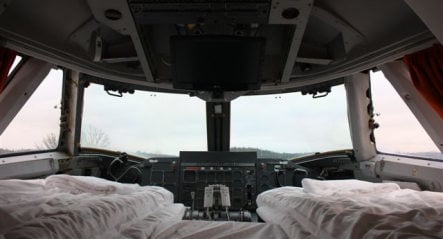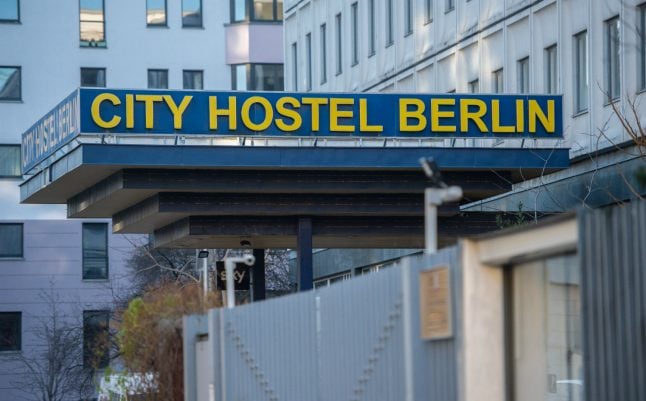I’m sitting upstairs in the first-class lounge of a Jumbo jet reading a newspaper and reclining in my leather chair, enjoying a view of the runway. This will be my home for the next 12 hours. Except the difference this time is that there is no pilot on board, I have no life vest under my seat, the safety instructions are missing, and I’m not flying anywhere. Instead, I am “overnighting” at the Jumbo Hostel at Arlanda airport.
The Jumbo Hostel parked on the outskirts of Arlanda airport is the brainwave of Uppsala native Oscar Diös who already owns two hostels in his local town.
“We wanted to expand south to the airport area and I found out about this plane lying here idle and thought it would be good for a hostel,” he says. In the end, he bought it “for around the same price as a family-sized house in the Stockholm area” without disclosing the actual price; and renamed the plane “Liv” after his 1½ year old daughter.
After parking our car in the neighbouring long-term carpark, my boyfriend Thomas and I pause a moment by the jumbo jet before climbing the three levels of stairs (there’s a lift for less-active visitors!) to the reception. As we approach the jumbo hostel, we get butterflies in our stomach, curious if the hostel will match our expectations. It’s the first time we have ever stood so close to a 747 on ground level and the sheer size of this flying monster makes us feel like midgets beside the huge wheels and landing gear equipment.
Before entering the main body of the aircraft, we have to remove our shoes. (Buggies and prams must also be parked outside). We exchange formalities with Australian Rodi Serov Pearson, receptionist and ex-flight attendant, who is wearing his flight uniform and impresses us with the fact he speaks not only fluent Swedish, but also Finnish.
Just like in any other hotel, we fill out the registration forms, noticing the oxygen masks hanging at the back of the reception and the Jumbo Hostel business cards, designed like airline boarding passes. To the left of the reception is a small café and communal lounge area with TV. A Swedish company redesigned the plane and the interior has a kind of “70’s style retro feeling from the glorious Pan-Am days,” according to Rodi.
Rodi’s been with the Jumbo Hostel during its development stage but after six months watching his former colleagues taking off and landing on the runway next to the Jumbo Hostel, he’s got itchy feet to get back in the air again and is leaving a few days after our stay. Interestingly, two out of the eight “Jumbo crew” are ex-cabin crew and a third is training to be a pilot.
We have booked the hostel’s highlight – the cockpit suite. So from the reception, it’s up another narrow winding staircase to the Jumbo’s “first-class”. Standing outside the aptly named Room 747, we open the door, wondering what we can expect for our 3,300 kronor. Will it resemble the press pictures or …? The door opens and we both exclaim “wow” at the same time … both of us have seen millions of hotel rooms around the globe but this is really something special.
In front of us (and above our heads) stands the original cockpit control panel and windows. In between the two single beds hangs a flat screen TV. The suite’s a clever mix of original 747 gadgets and modern clean-cut design. And it works.
In the corner is the door to a private bathroom. The bathroom is comfortable and in the left hand corner lies a small airplane window … just in case you forget when you take your morning shower that you are in the upper level of a 747! The only thing my hotel trained eye misses are some hooks to hang up towels and the luxury toiletry products you normally get in a hotel suite.
This Boeing 747-212B aircraft has clocked up quite some history during its glory days. It made its first flight in 1976 and belonged to Singapore Airlines before being sold to Pan Am in 1984 and renamed “Clipper Belle of the Sky”. On May 1, 2007 Oscar Diös bought it and in August 2008 moved it to its current position. The Jumbo got a facelift and on January 15th, 2009, opened its doors as a hostel with 26 rooms and 73 beds.
After seeing the cockpit, Rodi takes us on a guided tour. The dorm rooms have two sets of bunk beds and the more expensive “Private 1-2-3” rooms can sleep one to three people. All rooms have a flat screen TV and the original overhead baggage compartment where you can store bits and pieces. And in typical Boeing style, all room numbers begin with a 7. (By the way, room 745 is one of the nicest private rooms with a view).
I usually avoid hostels and communal bathrooms as I’m not a big fan of public showers and long morning queues – but these ones are not bad at all. There are eight bathrooms in total with showers – which basically means you can lock the door and shower in private. The night we stay over is quiet, the hostel is only around half full but the place feels fresh and immaculate.
The Jumbo Hostel is being positioned as an upmarket kind of hostel. “The reception staff on duty do everything from check in and concierge service to light cleaning and ordering supplies,” says Rodi, “just like on a plane.” He tells us that housekeeping, catering and laundry are all outsourced. “There’s not much space for storage on board so every morning we fax our suppliers a list of what we need for the day.”
In the corridors, there are two internet terminals – with tourist information about Stockholm. But if you have your own laptop, there’s free wireless internet on board, just get a code at reception. At the end of the corridors, there’s a long sink, iron and ironing board and hairdryer just so you know you are still in a hostel!
The upper floor of the aircraft has been split between the cockpit suite and a small “business lounge” with flat screen TV which can hold 8-10 people for a conference and costs SEK 2,000 per day plus SEK 140 per head for a “business class in-flight meal.” But if you’re staying in the cockpit suite, regard it as your private living room …. In the evenings, the staircase is blocked off so you have the whole upstairs to yourselves. The ash trays in the seat pockets remind me of the days when smoking was allowed, even on inter-continental flights. All that’s missing is seatbelts and life vests under the seats.
There’s no restaurant (or alcohol) on board the Jumbo Hostel – not yet anyway but Oscar is not finished, yet. He has plans to open a walkway and observation point on the left wing; to convert the engines into two more double rooms; and perhaps to add on a restaurant with alcohol licence.
However, you can purchase some snacks, pasta salads, sandwiches and pre-packed meals at the reception area. If you bring your own groceries, there are two microwaves you can use to heat up your own food.
Ventilation and insulation (for heat and noise), according to Oscar, were the biggest challenges in converting the plane. When we climb into our “cockpit” bed that night, I can still hear traffic on the runway but it’s more like a dimmed background noise like a TV on low volume rather than the nervy sounds of a loud highway.
We can see the runway through the right hand windows of the aircraft (left side if you are standing outside looking up at the aircraft). I feel high up. The bed is comfortable but slants slightly to one side. I raise the level of my bed and start fiddling around with the steering wheel, emergency break and buttons on the roof. Not for the first time, I wonder how such a monstrous machine flies and how it can all be controlled from this tiny room. To the right of my bed is the “oxygen dilutor” button and above me are 101 knobs and buttons for radio traffic control. Before falling asleep, I remember Rodi’s words: “We get strong winds at Arlanda, sometimes you can feel the plane rocking a bit.” But tonight, all is calm.
The next morning we awake to blue skies and a steady queue of planes – SAS, Continental, Lufthansa, British Airways taxiing around the corner towards the terminal buildings. Breakfast is basic but fun – a small plastic tray with continental breakfast with fresh bread and coffee – just like on a real flight.
The experience of staying overnight in the world’s first converted jumbo jet is a great one. And even though it’s far from cheap, the cockpit suite is definitely worth splashing out on – remember a first-class seat on a long-haul flight will cost you at least ten times this price tag and without a private cockpit tour. Oscar has plans to extend the “Jumbo Hostel” concept by franchising the brand but his lips are sealed as to where we can expect to see the next one.
Even if you don’t stay over night, the Jumbo Hostel is open to the public so you can pop by for a coffee break and take a look around – perfect for kids and bigger kids. And coffee at 15 kronor a cup won’t break the wallet.
Inspiration at the Jumbo Hostel
Don’t expect five star entertainment on board, but here are some tips on how to spend the time:
1. Bring your own inflight entertainment kit – iPod, laptop, books, magazines. It’s perfect chill-out time.
2. Viewing platform of Runway 3 – take Bus 583 towards Märsta and get off at Skogsvägen/Östra Hangarvägenviewing point.
3. Hang out at the SAS Flight Academy café across the street; meals from SEK 75. It’s open 11-14 and 14.30-18.00 Mon-Fri; 11-18 Sat.
4. Sky City – 15 mins approx to walk or Bus number 14 goes there every 15 minutes. Shops, cafes and restaurants.
5. Games cabinet in the Jumbo Hostel has cards, chess. Ask at reception.
6. Use the small pool, gym and sauna across the road at the Radisson SAS Arlandia Hotel. Jumbo Hostel guests get a special rate. (SEK 75 per adult; SEK 290 for a private sauna).




 Please whitelist us to continue reading.
Please whitelist us to continue reading.